Innovative Pedagogies for Industry 4.0: Teaching RFID with Serious Games in a Project-Based Learning Environment
Abstract
1. Introduction
- Massification and Diversification of Higher Education: The increased access to higher education has resulted in a diversification of student profiles. This shift requires the adaptation of teaching methods to address a wide range of needs and varying levels of preparation (Shields & Masardo, 2018).
- Digital Integration: The advent of digital technologies has revolutionized pedagogical approaches through the introduction of e-learning platforms, open educational resources, and Massive Open Online Courses (MOOCs). This digital transformation has enhanced flexibility in both teaching and learning (Saadatdoost et al., 2015).
- Student-Centered Approaches: Pedagogical methods have shifted towards learner-centered strategies, prioritizing active learning, problem-solving, and collaborative projects. These approaches aim to foster transferable skills, including critical thinking and self-reflection (Gennen, 2024).
- Distance Learning and Hybrid Teaching: Distance learning and hybrid modalities, which combine face-to-face and online teaching, have expanded, providing greater flexibility for students and accommodating geographical and time constraints (Bartolic et al., 2022).
- Pedagogical Innovations: Initiatives such as flipped classrooms, problem-based learning, and the use of virtual laboratories have been implemented to enhance the learning experience and better equip students to meet the demands of the professional world (Bartolic et al., 2022).
- Addressing Societal Transitions: Universities are adapting their strategies to tackle contemporary challenges, such as the ecological transition and the integration of artificial intelligence. This involves training educators and revising curricula to incorporate these critical themes (Rousell & Sinclair, 2024).
2. Materials and Methods
2.1. Training Module Description for the EEIC Department
- Apply the skills they learn in their various courses (lectures, tutorials, practical work).
- Work in project mode (alone or in groups).
- Be assessed comprehensively on their skills.
- Make learning meaningful: subjects are not tackled in isolation, but rather through an integrated approach.
- Put the student in an active position, as if they were in a professional context.
- Assess the skills targeted in the BUT (according to the program’s skill blocks).
2.2. Material, General Description
- Supply chain management (real-time tracking of products and stocks, optimization of inventory processes, etc.),
- Retail (contactless payment systems, loss prevention by rapidly identifying unregistered items…),
- Industrial (Tracking assets and equipment in factories, automating processes as part of Industry 4.0…),
- Transport and logistics (Electronic toll systems, vehicle fleet management…),
- Healthcare (identification of patients and medical equipment, traceability of medicines to avoid errors…),
- Security and access control (entry management in secure areas, identity validation in airports or sensitive buildings…).
2.3. Method
2.3.1. Game-Based Learning
- Attention and engagement: By using attractive visual and audio elements, adapted challenges and reward mechanisms.
- Increased motivation: Play stimulates the pleasure hormone dopamine, which boosts learners’ motivation and commitment.
- Easier memorization: The positive emotions generated by games help to anchor information in long-term memory.
- Active learning: Games encourage experimentation, decision-making and problem-solving, leading to deeper learning.
- Development of cross-disciplinary skills: Collaboration, communication, creativity, critical thinking… Play stimulates a multitude of essential skills.
- Reduced stress and anxiety: The playful aspect of learning creates a relaxed environment conducive to the assimilation of knowledge.
- Reinforcing general or domain-specific knowledge,
- Encouraging quick thinking,
- Providing immediate feedback and support information retention,
- Facilitating review sessions.
- It fosters healthy competition, stimulating participation and motivation,
- It builds a sense of belonging through team-based play,
- It offers the flexibility to customize questions and categories to suit specific learning objectives,
- It is adaptable to both synchronous and asynchronous learning environments.
2.3.2. Using a Development RFID NFC Kit
- Use a kit to understand the operating concepts of an RFID solution,
- Use and configure a digital oscilloscope,
- Follow a measurement protocol,
- Export measurements in standard files (csv),
- Exploit measurements and tests,
- Use technical documents,
- Write an activity report.
2.3.3. Real-Life Industrial Application
- Allocate tasks for the team,
- Understand the manufacturer’s recommendations (technical documents),
- Take inspiration from YouTube videos to develop the solution,
- Identify and configure (hardware, computer network, cabling),
- Configure and program a solution with TIAPORTAL V16,
- Connect the system’s inputs and outputs electrically,
- Read/write RFID tags,
- Collect and format stored information (RFID) in a dynamic Excel table,
- Deliver the final solution with document management (technical file, activity report, etc.).
3. Results
3.1. Serious Game
3.2. RFID Kit
3.3. Challenge
3.4. Skills Assessment by the Teacher and Student Feedback
3.5. Feedback from the Skkynet Partner
4. Conclusions
Author Contributions
Funding
Institutional Review Board Statement
Informed Consent Statement
Data Availability Statement
Acknowledgments
Conflicts of Interest
References
- Alsawaier, R. S. (2018). The effect of gamification on motivation and engagement. The International Journal of Information and Learning Technology, 35(1), 56–79. [Google Scholar] [CrossRef]
- Altanis, I., Retalis, S., & Petropoulou, O. (2018). Systematic design and rapid development of motion-based touchless games for enhancing students’ thinking skills. Education Sciences, 8(1), 18. [Google Scholar] [CrossRef]
- Aura, I., Hassan, L., & Hamari, J. (2023). Transforming a school into Hogwarts: Storification of classrooms and students’ social behaviour. Educational Review, 77(1), 1–20. [Google Scholar] [CrossRef]
- Bartolic, S. K., Boud, D., Agapito, J., Verpoorten, D., Williams, S., Lutze-Mann, L., Matzat, U., Moreno, M. M., Polly, P., Tai, J., & Marsh, H. L. (2022). A multi-institutional assessment of changes in higher education teaching and learning in the face of COVID-19. Educational Review, 74(3), 517–533. [Google Scholar] [CrossRef]
- Buehl, D. (2023). Classroom strategies for interactive learning. Routledge. [Google Scholar]
- Cooper, K. M., & Bucchiarone, A. (2023). Software engineering for games in serious contexts. Springer. [Google Scholar]
- Cui, L., Zhang, Z., Gao, N., Meng, Z., & Li, Z. (2019). Radio frequency identification and sensing techniques and their applications—A review of the state-of-the-art. Sensors, 19(18), 4012. [Google Scholar] [CrossRef] [PubMed]
- Damaševičius, R., Maskeliūnas, R., & Blažauskas, T. (2023). Serious games and gamification in healthcare: A meta-review. Information, 14(2), 105. [Google Scholar] [CrossRef]
- Efland, A. D. (1990). A history of art education. Teachers College Press. [Google Scholar]
- Fitrah, M., Sofroniou, A., Setiawan, C., Widihastuti, W., Yarmanetti, N., Jaya, M. P. S., Panuntun, J. G., Arfaton, A., Beteno, S., & Susianti, I. (2025). The impact of integrated project-based learning and flipped classroom on students’ computational thinking skills: Embedded mixed methods. Education Sciences, 15(4), 448. [Google Scholar] [CrossRef]
- Gautier, C. (2022). Transformation des DUT en BUT: Quel impact sur les candidatures des lycéens et la sélection des établissements? Échanges, 43, 43–58. [Google Scholar]
- Gennen, T. (2024). Reevaluating student-centred education: Uncovering learning difficulties stemming from empiricist epistemological assumptions. Educational Review, 77(3), 894–920. [Google Scholar] [CrossRef]
- Hernandez-de-Menendez, M., Escobar Díaz, C., & Morales-Menendez, R. (2020). Technologies for the future of learning: State of the art. International Journal on Interactive Design and Manufacturing (IJIDeM), 14(2), 683–695. [Google Scholar] [CrossRef]
- Hofstede, G. J., & Tipton Murff, E. J. (2012). Repurposing an old game for an international world. Simulation & Gaming, 43(1), 34–50. [Google Scholar]
- ISO. (2010). Information technology—Radio frequency identification for item management—Part 3: Parameters for air interface communications at 13.56 MHz (ISO/IEC 18000-3). ISO. [Google Scholar]
- Järvenoja, H., Malmberg, J., Törmänen, T., Mänty, K., Haataja, E., Ahola, S., & Järvelä, S. (2020). A collaborative learning design for promoting and analyzing adaptive motivation and emotion regulation in the science classroom. In Frontiers in education. Frontiers Media SA. [Google Scholar]
- Karagiorgas, D. N., & Niemann, S. (2017). Gamification and game-based learning. Journal of Educational Technology Systems, 45(4), 499–519. [Google Scholar] [CrossRef]
- Khine, M. S. (2024). Motivation and technology. In Motivation science (pp. 427–522). Springer. [Google Scholar]
- Kim, J., & Maloney, E. J. (2020). Learning innovation and the future of higher education. JHU Press. [Google Scholar]
- Marshall, C. (2017). Montessori education: A review of the evidence base. npj Science of Learning, 2(1), 11. [Google Scholar] [CrossRef] [PubMed]
- Matins, J. E. P. (2024). Design of an electronic device in the STEAM context to relate results of physical measurements with sounds, and its analysis through science teachers’ perception. IJERI: International Journal of Educational Research and Innovation, (21), 1–21. [Google Scholar] [CrossRef]
- Ministère de l’Enseignement Supérieur de la Recherche et de l’Innovation. (2022). Bachelor universitaire de technologie, Génie électrique et informatique industrielle (PN LP-BUT GEII). Ministère de l’Enseignement Supérieur de la Recherche et de l’Innovation. [Google Scholar]
- Parra-González, M. E., Segura-Robles, A., & Gómez-Barajas, E. R. (2020). Assessing gamified experiences in physical education teachers and students. IJERI: International journal of Educational Research and Innovation, 13, 166–176. [Google Scholar] [CrossRef]
- Pérez, J. D. C., Moreno-Rodríguez, R., & Custodio, N. F. (2023). Development of empathy and ethical values through role-playing games as innovation for education in values. IJERI: International journal of Educational Research and Innovation, (19), 109–122. [Google Scholar] [CrossRef]
- Protopsaltis, A., Auneau, L., Dunwell, I., De Freitas, S., Petridis, P., Arnab, S., Scarle, S., & Hendrix, M. (2011, October 3–5). Scenario-based serious games repurposing. 29th ACM International Conference on Design of Communication, Pisa, Italy. [Google Scholar]
- Rosário, A. T., & Dias, J. C. (2024). Implementing problem-based learning in marketing education: A systematic review and analysis. Education Sciences, 14(11), 1139. [Google Scholar] [CrossRef]
- Rousell, D., & Sinclair, M. P. (2024). Desiring-futures in education policy: Assemblage theory, artificial intelligence, and UNESCO’s futures of education. Educational Review, 1–24. [Google Scholar] [CrossRef]
- Saadatdoost, R., Sim, A. T. H., Jafarkarimi, H., & Mei Hee, J. (2015). Exploring MOOC from education and information systems perspectives: A short literature review. Educational Review, 67(4), 505–518. [Google Scholar] [CrossRef]
- Shields, R., & Masardo, A. (2018). False equivalence? Differences in the post-16 qualifications market and outcomes in higher education. Educational Review, 70(2), 149–166. [Google Scholar] [CrossRef]
- Silva, M., Paiva, A. C., & Mendes, A. (2025). GAMFLEW: Serious game to teach white-box testing. Software Quality Journal, 33(1), 5. [Google Scholar] [CrossRef]
- Sukackė, V., Guerra, A. O., Ellinger, D., Carlos, V., Petronienė, S., Gaižiūnienė, L., Blanch, S., Marbà-Tallada, A., & Brose, A. (2022). Towards active evidence-based learning in engineering education: A systematic literature review of PBL, PjBL, and CBL. Sustainability, 14(21), 13955. [Google Scholar] [CrossRef]
- Tu, F., Wu, L., Kinshuk, Ding, J., & Chen, H. (2025). Exploring the influence of regulated learning processes on learners’ prestige in project-based learning. Education and Information Technologies, 30(2), 2299–2329. [Google Scholar] [CrossRef]
- Vergara, D., Antón-Sancho, Á., & Fernández-Arias, P. (2023). Player profiles for game-based applications in engineering education. Computer Applications in Engineering Education, 31(1), 154–175. [Google Scholar] [CrossRef]
- Vrignat, P., Avila, M., Marangé, P., & Kratz, F. (2023, March 1–3). University education adapts to industry 4.0 topic. International Conference on Remote Engineering and Virtual Instrumentation, Thessaloniki, Greece. [Google Scholar]
- Vrignat, P., Charrière, C., Avila, M., Duculty, F., Begot, S., & Bardet, J.-C. (2024, April 2–4). How to apply digital function interconnection requirements into a SCADA environment for Industry 4.0? IICE, Dublin, Ireland. [Google Scholar]
- Vrignat, P., Delouche, D., Avila, M., & Kratz, F. (2020, July 12–17). Industry 4.0: Introduction to the continuous improvement of an industrial process for Master’s students. 21st IFAC World Congress, Berlin, Germany. [Google Scholar]
- Wilder, S. (2015). Impact of problem-based learning on academic achievement in high school: A systematic review. Educational Review, 67(4), 414–435. [Google Scholar] [CrossRef]

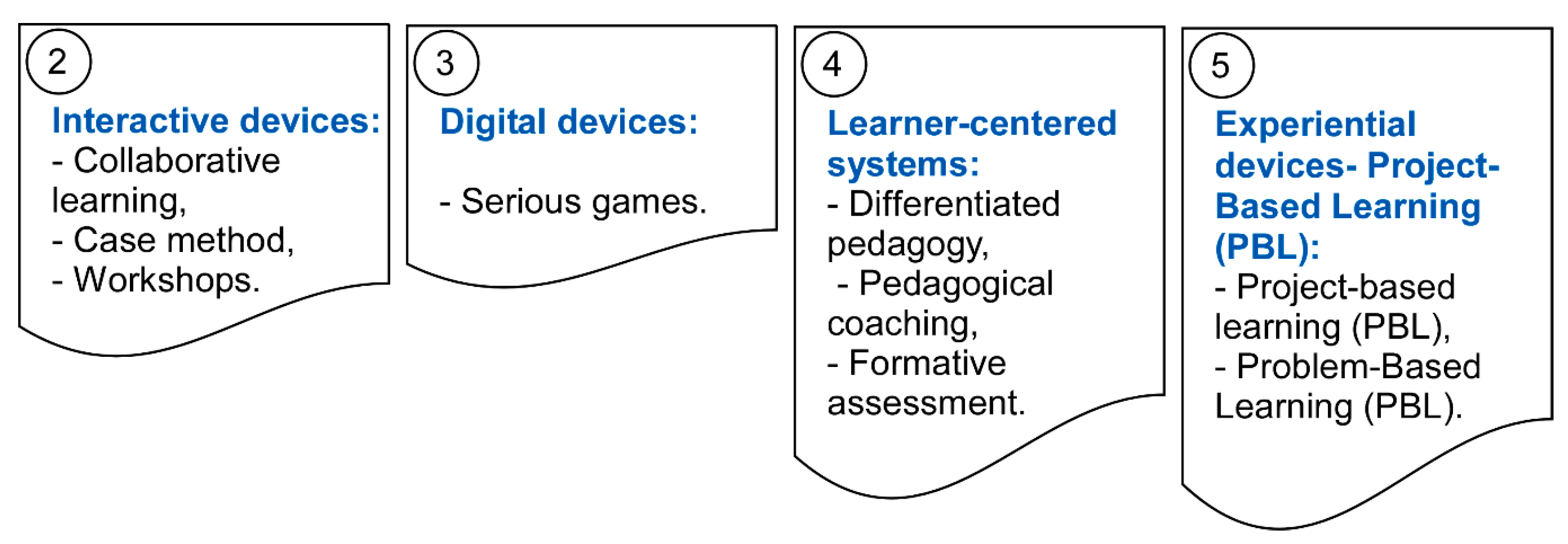

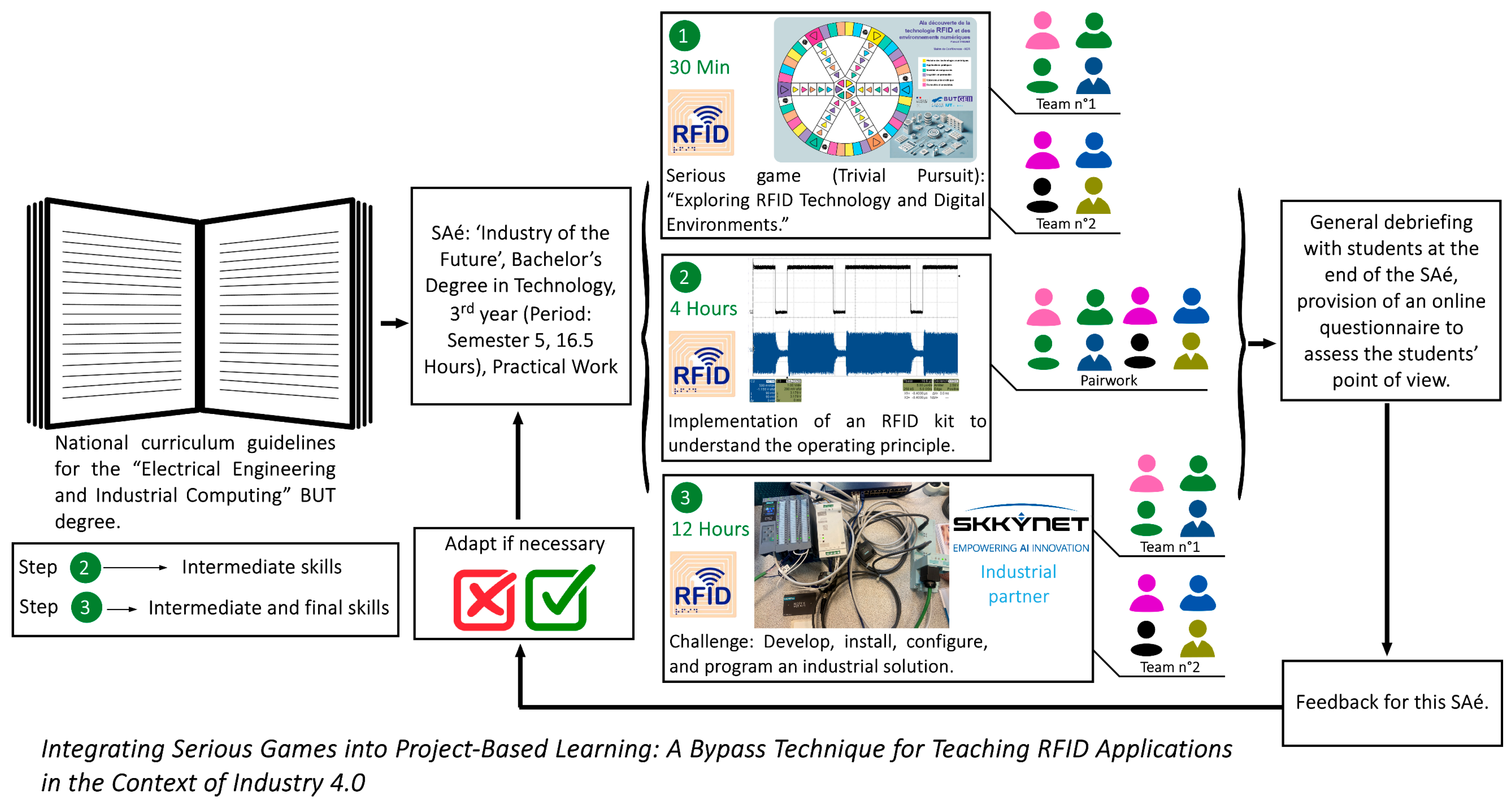
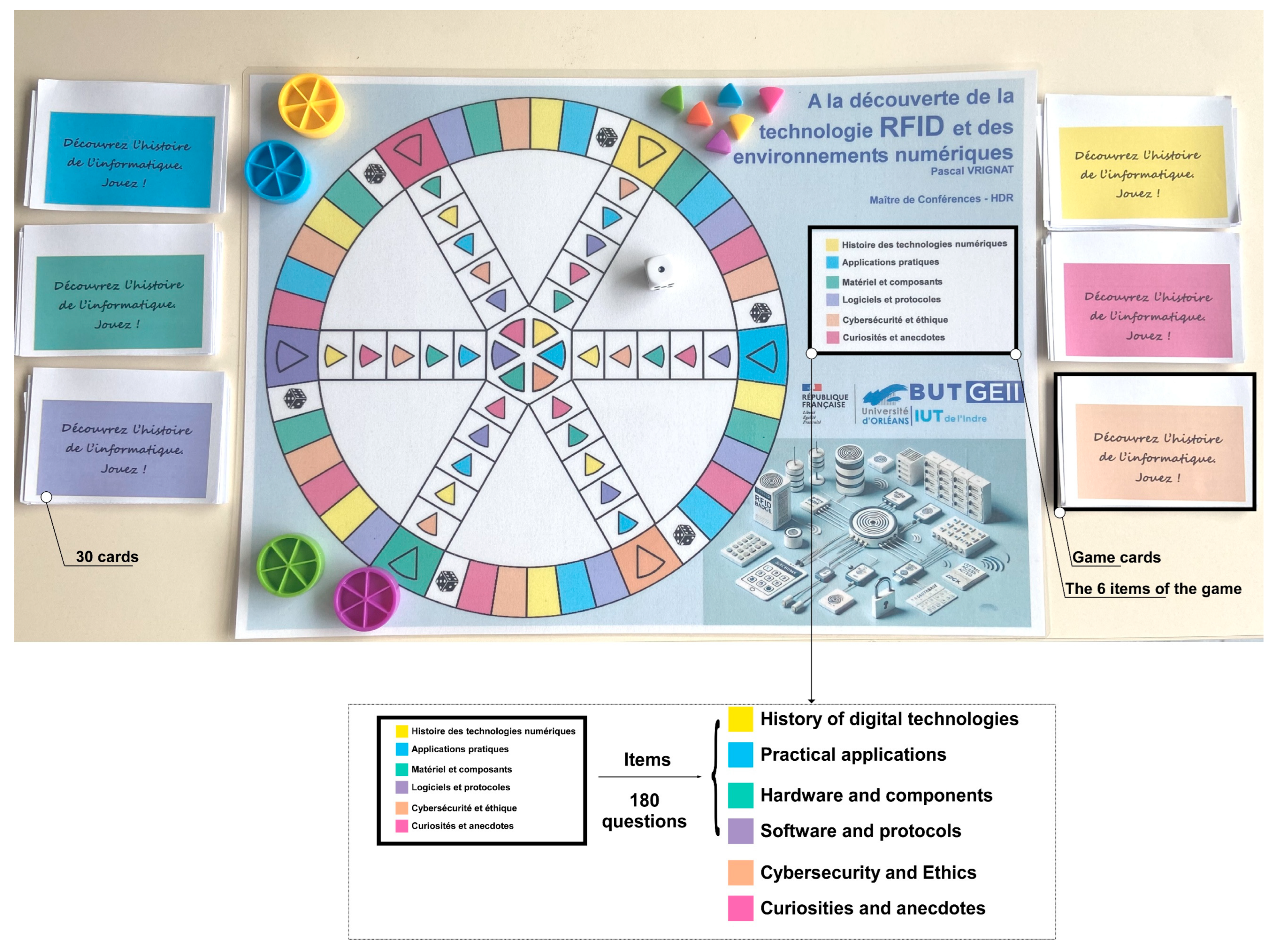

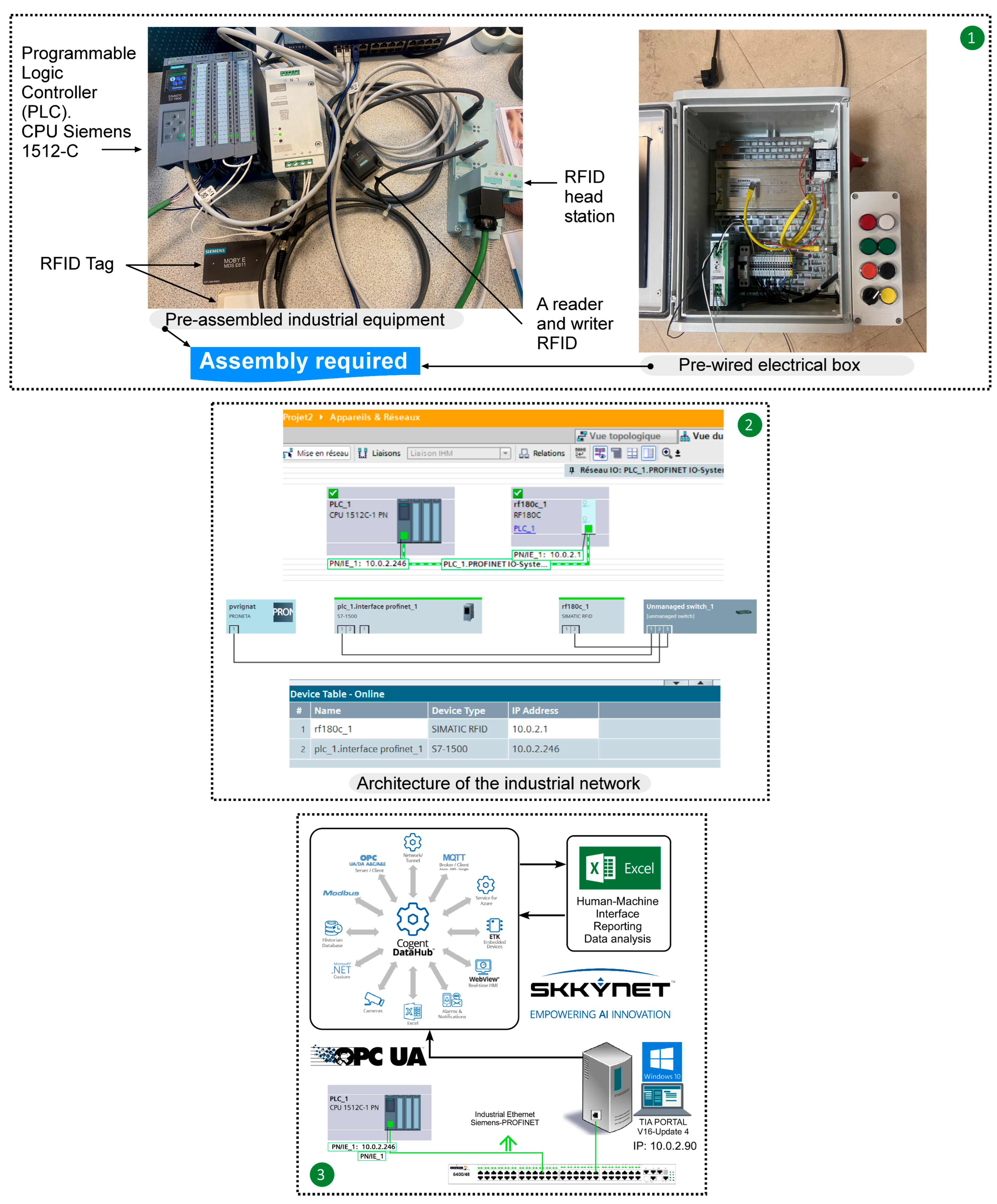

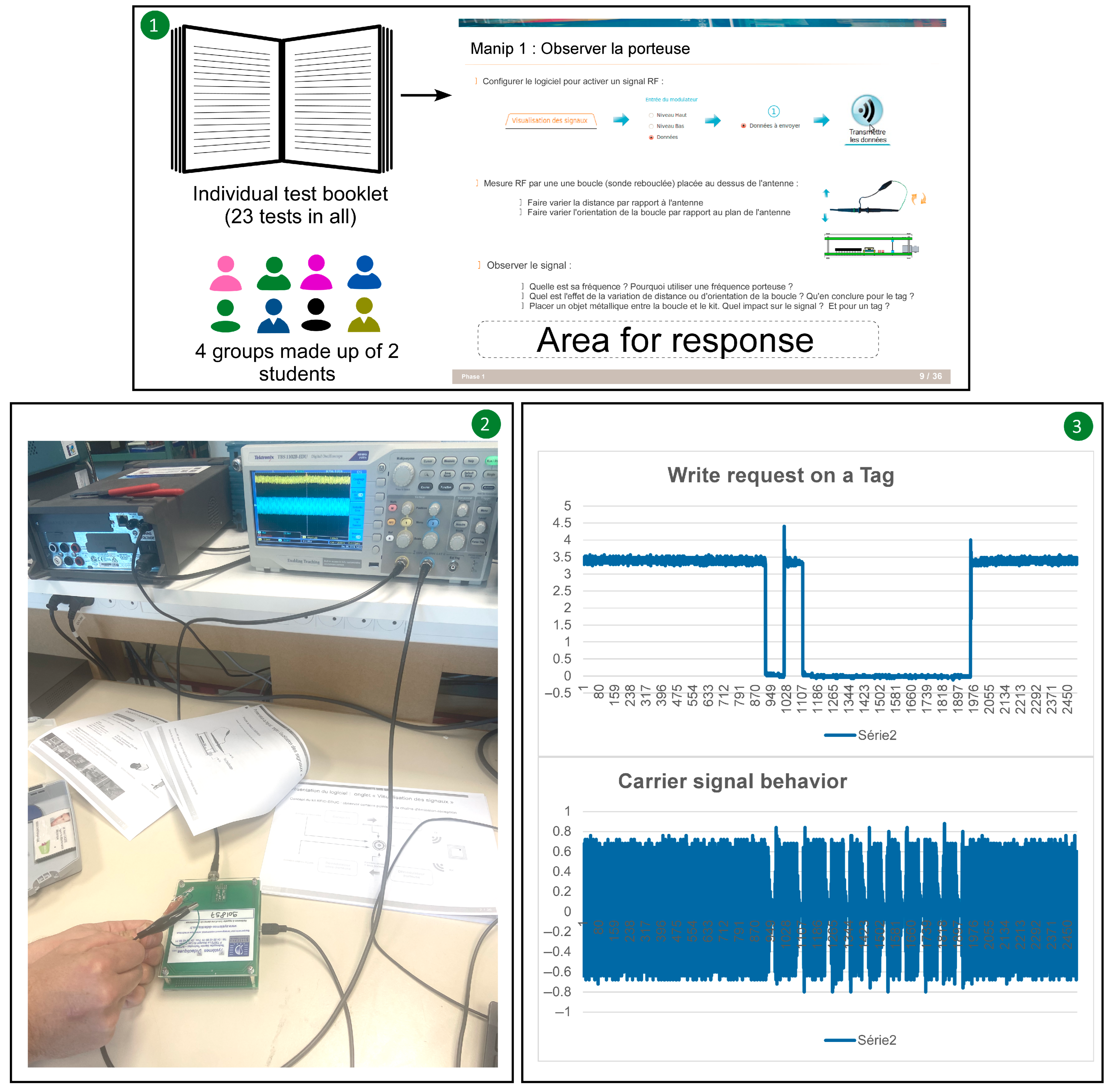
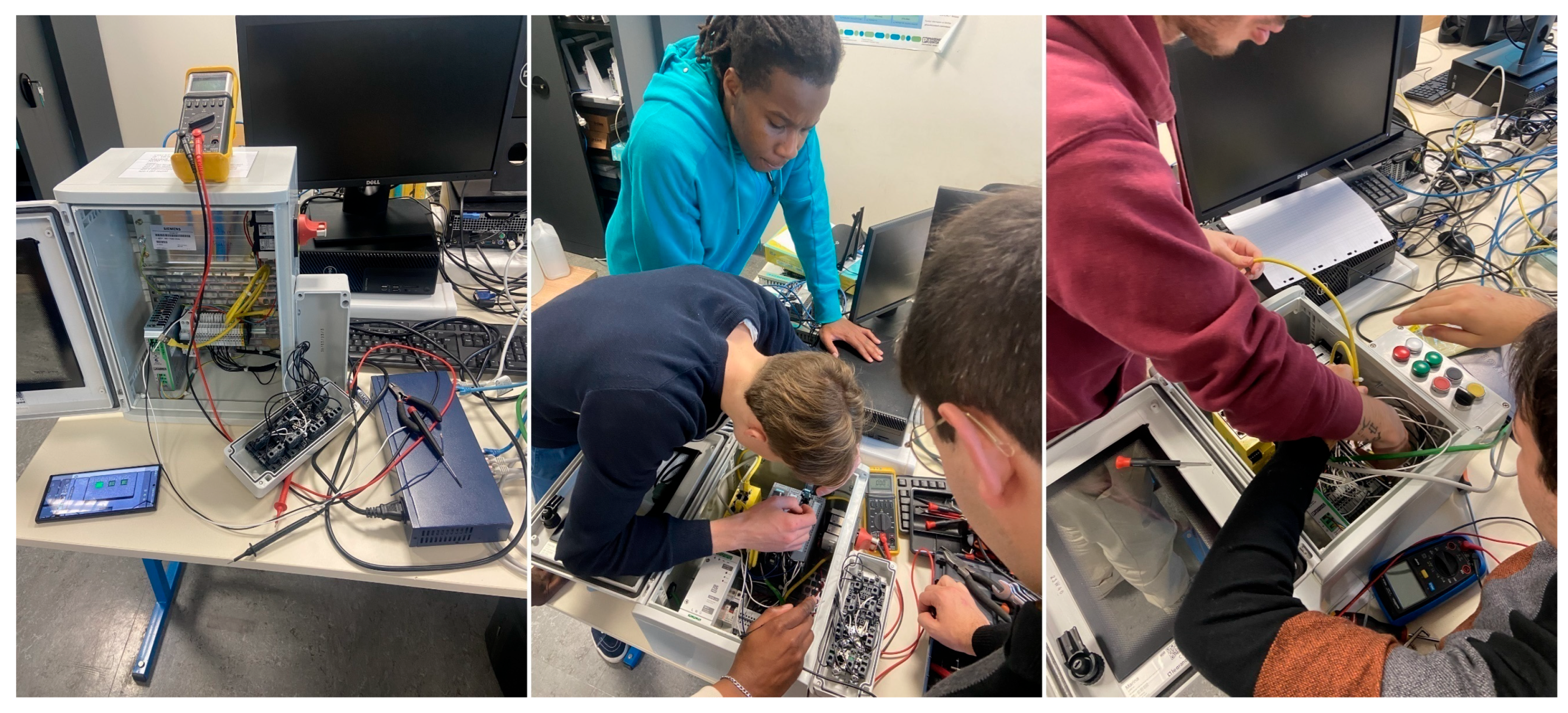
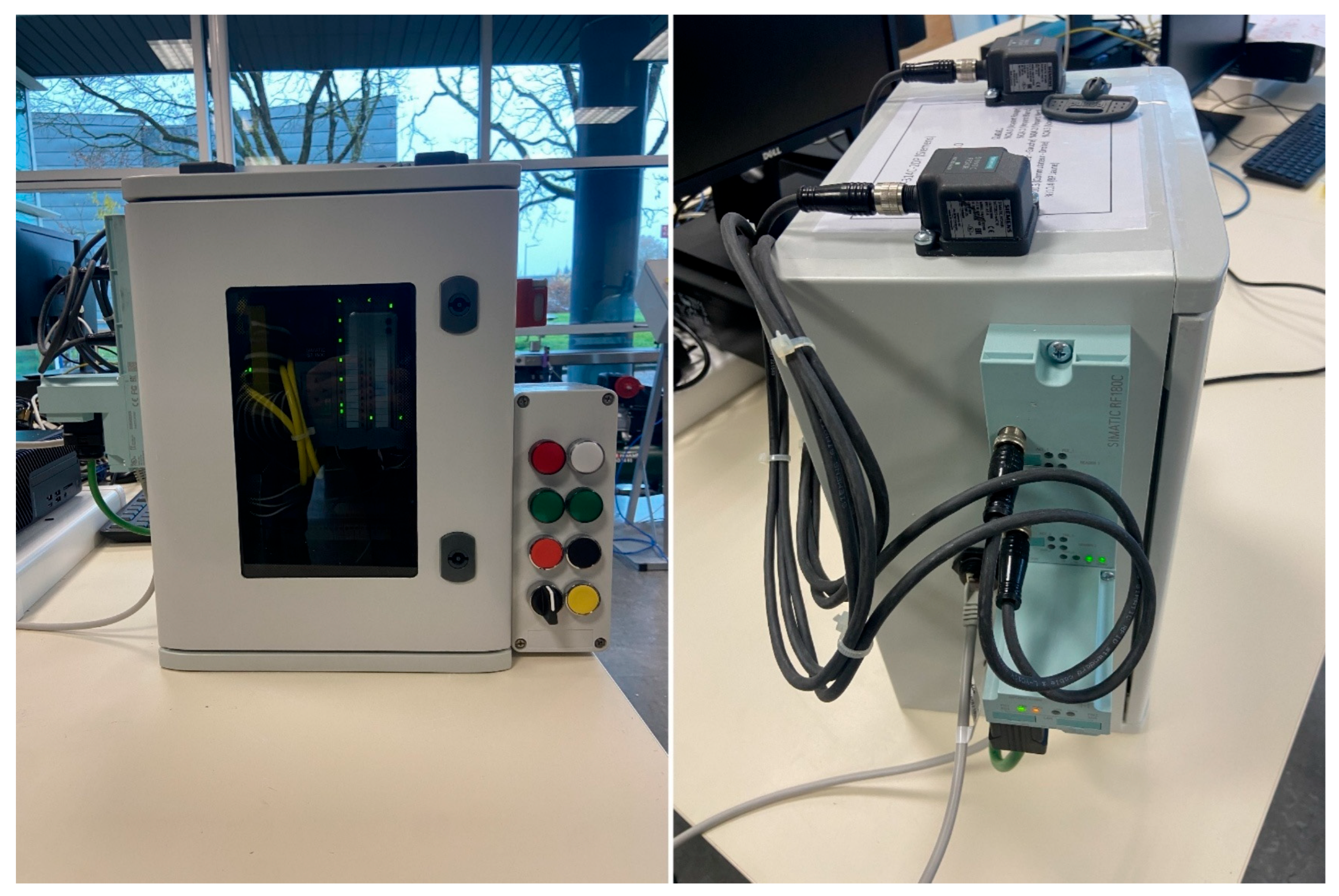
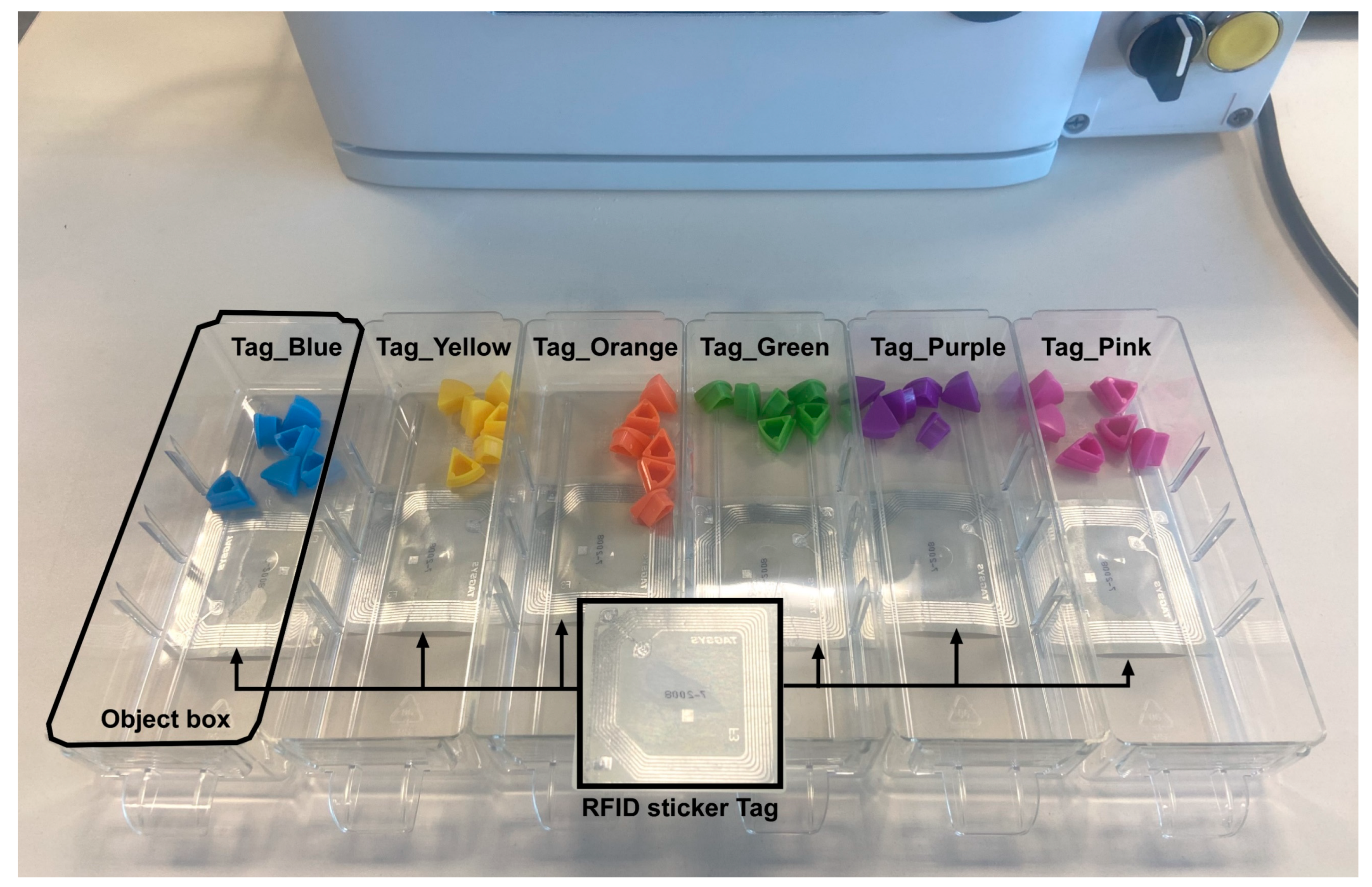
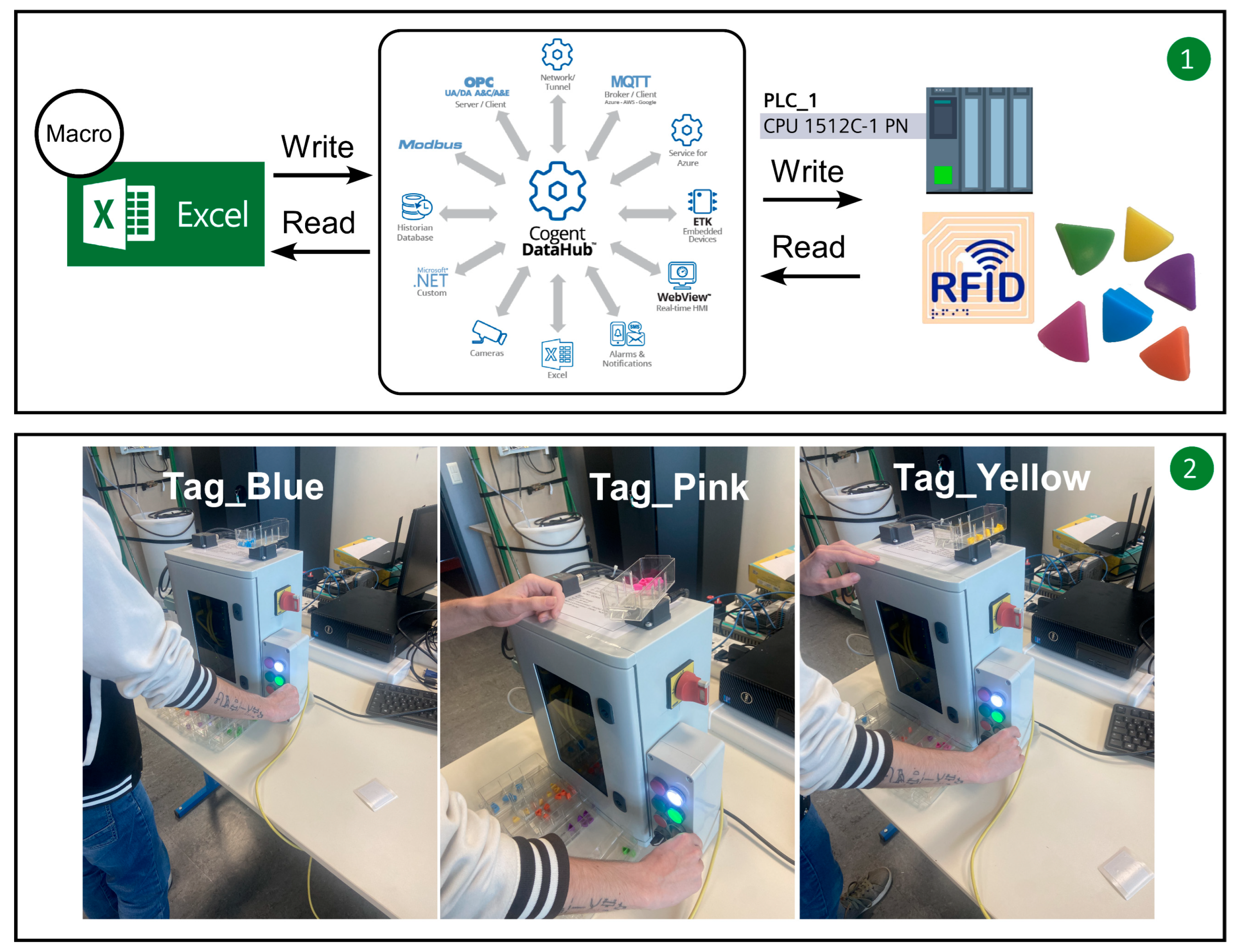
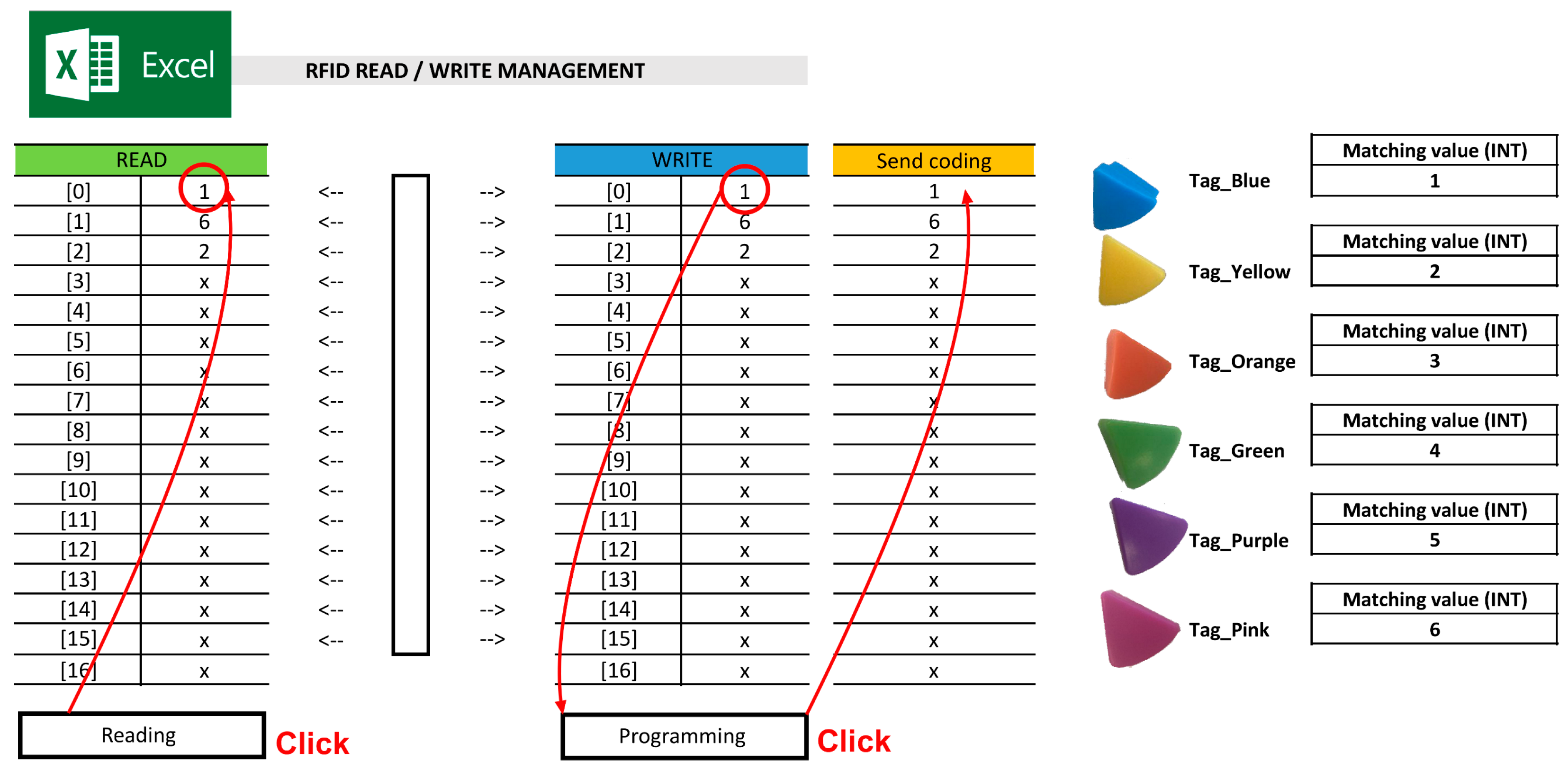
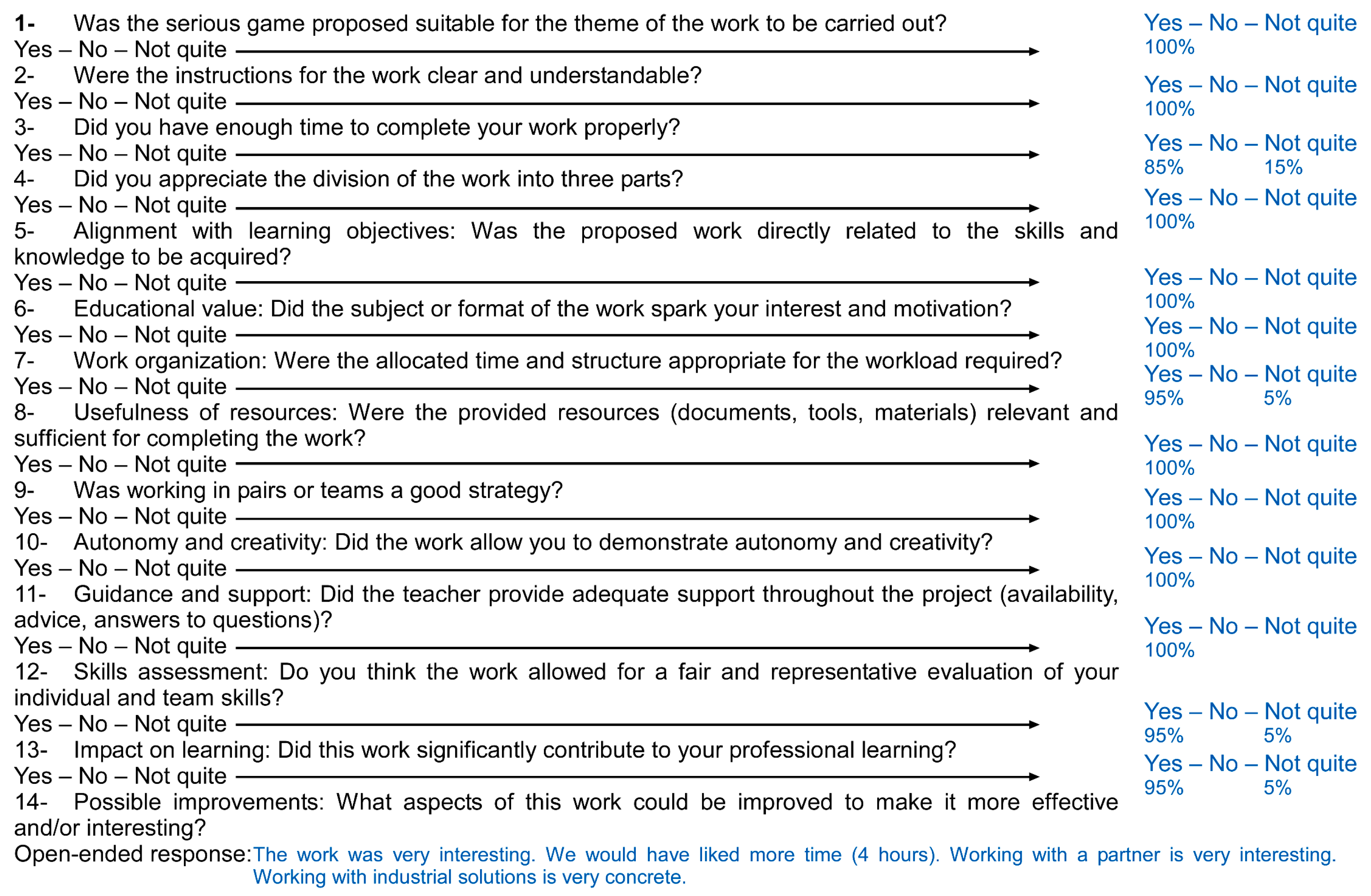
Disclaimer/Publisher’s Note: The statements, opinions and data contained in all publications are solely those of the individual author(s) and contributor(s) and not of MDPI and/or the editor(s). MDPI and/or the editor(s) disclaim responsibility for any injury to people or property resulting from any ideas, methods, instructions or products referred to in the content. |
© 2025 by the authors. Licensee MDPI, Basel, Switzerland. This article is an open access article distributed under the terms and conditions of the Creative Commons Attribution (CC BY) license (https://creativecommons.org/licenses/by/4.0/).
Share and Cite
Vrignat, P.; Avila, M.; Duculty, F.; Bardet, C.; Begot, S.; Marangé, P. Innovative Pedagogies for Industry 4.0: Teaching RFID with Serious Games in a Project-Based Learning Environment. Educ. Sci. 2025, 15, 953. https://doi.org/10.3390/educsci15080953
Vrignat P, Avila M, Duculty F, Bardet C, Begot S, Marangé P. Innovative Pedagogies for Industry 4.0: Teaching RFID with Serious Games in a Project-Based Learning Environment. Education Sciences. 2025; 15(8):953. https://doi.org/10.3390/educsci15080953
Chicago/Turabian StyleVrignat, Pascal, Manuel Avila, Florent Duculty, Christophe Bardet, Stéphane Begot, and Pascale Marangé. 2025. "Innovative Pedagogies for Industry 4.0: Teaching RFID with Serious Games in a Project-Based Learning Environment" Education Sciences 15, no. 8: 953. https://doi.org/10.3390/educsci15080953
APA StyleVrignat, P., Avila, M., Duculty, F., Bardet, C., Begot, S., & Marangé, P. (2025). Innovative Pedagogies for Industry 4.0: Teaching RFID with Serious Games in a Project-Based Learning Environment. Education Sciences, 15(8), 953. https://doi.org/10.3390/educsci15080953






